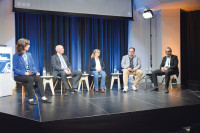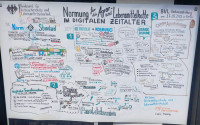The impact of digitalisation and artificial intelligence (AI) on standardisation and testing procedures in the agricultural and food chain was discussed by experts at a specialist event organised by the Federal Office of Consumer Protection and Food Safety (BVL) in Berlin on 27 May 2025. The challenges are great, but so are the opportunities. This was demonstrated, for example, by the results of a pilot project on the use of AI in the area of authenticity and origin testing of food.
At the conference, experts from science, industry and authorities discussed the importance of standards in the international movement of goods in the food industry, the role of metrology and standardisation and the potential of artificial intelligence in the evaluation of large amounts of data. "Standards are often invisible signposts and they ensure safety, quality and comparability," explained BVL President Friedel Cramer in his welcoming address. "In the digital age, they take on an additional dimension: They enable data exchange, ensure the interoperability of technical systems and create reliability in increasingly networked processes." Dr Sieglilnde Stähle from the German Food Association provided a very fitting introduction to the topic and showed the advantages of standardisation, although limits should also be set here, because "standardised food is a no-no".
A highlight of the event was the presentation of the results of a pilot project based at the BVL to develop an AI-supported evaluation tool for large amounts of data in order to determine the authenticity and origin of food through pattern recognition. Among other things, the three-year project tested the areas in which AI-controlled non-target methods (methods that do not specifically search for substances) can be used most successfully and which models are superior to traditional statistical methods. In the subsequent discussion, important aspects of the future application of such methods were discussed. Dr Sabine Kemmlein led through the findings, which were generated together with the provider Quodata from Dresden.
The digital transformation at the German Institute for Standardisation (DIN), the standardisation organisation in Germany, and the setting of international standards within the framework of the Codex Alimentarius Committee CCMAS (Codex Committee on Methods of Analysis and Sampling) were further focal points of the event, which were presented by Dr Franz Ulberth, former Head of the Food Integrity Department, Joint Research Centre of the European Commission. The event also focussed on Germany's contribution to standard setting in the CCMAS. In the Codex Alimentarius and its committees, the member states of the Food and Agriculture Organisation (FAO) and the World Health Organisation (WHO) develop common food standards. In the course of this, the question of whether the USA is also threatening to withdraw from the FAO was discussed.




